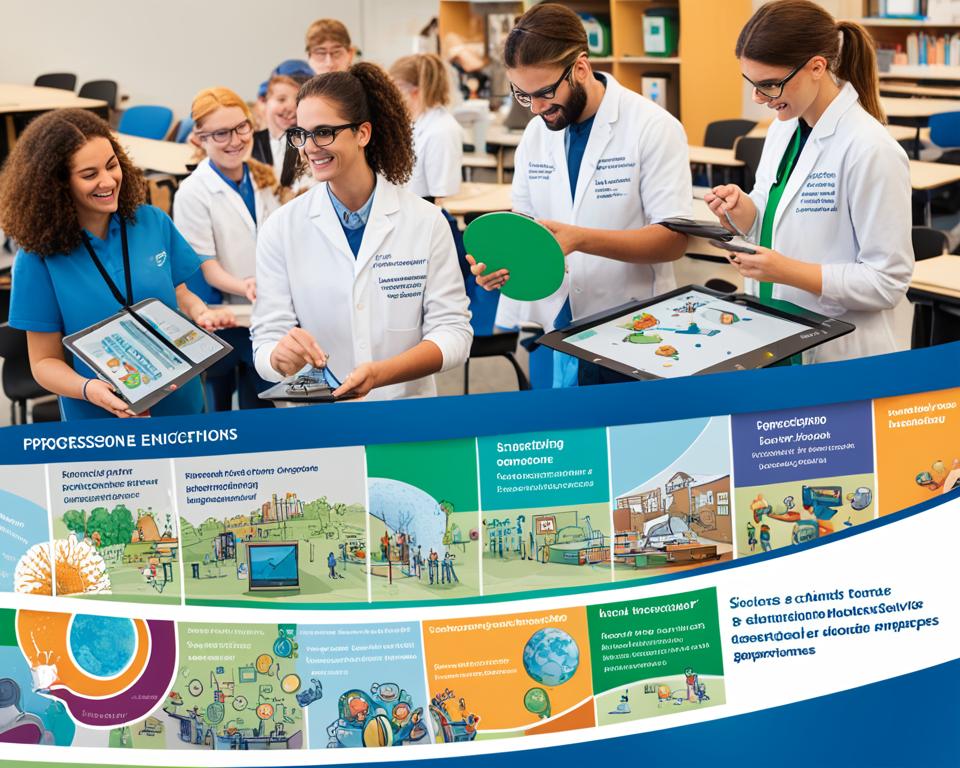Education & Medical
Nurturing the Seeds of Science: The Critical Role of Early Education
As an advocate for early education, I firmly believe in the critical role it plays in nurturing the seeds of science in young minds. The early years are a crucial time for laying the foundation of lifelong learning and fostering a love for science and exploration. By providing children with early STEM education, we give them the tools to develop critical thinking skills, curiosity, and a passion for understanding the world around them.
During these formative years, children are most receptive to learning and developing their scientific inquiry skills. By exposing them to hands-on experiences and engaging activities, we can awaken their natural curiosity and encourage them to ask questions, make observations, and explore the principles of science.
Early education sets the stage for empowering future scientists. It instills in them the confidence and skills necessary to make sense of the world through scientific inquiry. By nurturing and supporting their inquisitive minds, we can lay the groundwork for a lifelong journey of discovery and innovation.
Key Takeaways:
- Early education plays a critical role in nurturing a love for science and exploration.
- STEM education in the early years develops critical thinking skills and curiosity.
- Providing hands-on experiences and engaging activities fosters scientific inquiry.
- Empowering future scientists begins with confidence-building and skill development.
- Early education sets the stage for a lifelong journey of scientific discovery.
The Foundation of Scientific Inquiry in Early Education
Building curiosity and critical thinking in early education is essential for nurturing future scientists. By encouraging children to ask questions, explore their surroundings, and think critically, educators can lay the foundation for scientific inquiry.
Building Curiosity and Critical Thinking
In early childhood education, building curiosity and critical thinking skills is crucial for fostering a love for science and exploration. By creating an environment that encourages children to question, investigate, and make connections, educators can ignite their natural curiosity and develop their critical thinking skills. This sets the stage for scientific inquiry and the pursuit of knowledge.
Integrating STEM Learning Resources into Early Childhood Programs
Integrating STEM learning resources into early childhood programs is a powerful way to expose children to the principles of science, technology, engineering, and math. These resources can take the form of hands-on activities, experiments, educational toys, books, and digital tools. By providing children with engaging and interactive STEM experiences, educators can spark their interest in these fields and help them develop problem-solving and analytical skills that are essential for scientific inquiry.
Empowering Future Scientists Through Hands-on Learning

Empowering future scientists begins with hands-on learning experiences. By engaging children in activities that encourage exploration, experimentation, and problem-solving, educators can instill a sense of confidence and empowerment. Hands-on learning allows children to make connections between abstract concepts and real-world applications, fostering a deeper understanding of scientific principles. Through this approach, children develop the skills and mindset necessary to become successful scientists in the future.
Science Education Resources: Unlocking Potential in Young Minds
Science education resources are essential tools in unlocking the potential of young minds and fostering a love for scientific exploration. These resources provide students with the necessary knowledge, skills, and support to pursue their passion for science and make meaningful contributions to the field. In this section, we will explore two vital components of science education resources: scholarships for aspiring young scientists and investments in science programs for kids.
Scholarships for Aspiring Young Scientists
Scholarships play a pivotal role in empowering young scientists to pursue their dreams. These financial opportunities provide talented individuals with the means to access quality education, conduct research, and explore scientific endeavors. By removing financial barriers, scholarships enable young scientists to fully dedicate themselves to their studies and embrace the world of science.
Investing in Science Programs for Kids
Investing in science programs for kids is a crucial step in nurturing their scientific curiosity and passion. These programs, such as after-school clubs and summer camps, offer children hands-on experiences and exposure to various scientific disciplines. By engaging in interactive activities and experiments, kids develop a deeper understanding of STEM concepts and enhance their problem-solving and critical thinking skills. Additionally, these programs foster a sense of community and collaboration among young scientists, creating a supportive environment for learning and growth.
By providing scholarships for aspiring young scientists and investing in science programs for kids, we can unlock the potential of young minds and pave the way for a future generation of innovative scientific leaders.
The Evolution of Science Education for Youth
Science education for youth has evolved over time to meet the changing needs and demands of the modern world. With advancements in technology and a greater emphasis on STEM fields, science education has become more interactive, interdisciplinary, and focused on real-world applications. Today, youth science education incorporates hands-on experiments, project-based learning, and the use of digital tools and resources to engage and inspire young learners.

Addressing the Gender Gap in Science from the Start
The gender gap in science remains a significant challenge that needs to be addressed from the early stages of education. It is crucial to inspire and encourage girls to pursue STEM education and careers, providing them with equal opportunities to explore and engage with science.
Inspiring Girls to Pursue STEM Education
To inspire girls to pursue STEM education, we need to create an environment that fosters their interest and curiosity in science. By offering hands-on learning experiences, interactive activities, and engaging curriculum, we can ignite their passion for STEM subjects. It is essential to emphasize the relevance of science in their daily lives and showcase how STEM fields contribute to solving real-world problems.
Furthermore, we must actively promote and encourage girls’ participation in science-related extracurricular activities, clubs, and competitions. These opportunities allow them to further explore their interests, build confidence, and develop the necessary skills for future success in STEM.
Role Models and Youth Empowerment Programs
Role models play a crucial role in inspiring and empowering girls to pursue science. By highlighting the achievements and contributions of women in STEM fields, we can provide girls with relatable and aspirational figures who have succeeded in these domains. Sharing stories of successful female scientists and professionals helps girls envision themselves in similar roles and breaks down the barriers they may perceive.
Youth empowerment programs, specifically designed for girls in STEM, are instrumental in supporting their education and career goals. These programs provide mentorship, guidance, and resources, ensuring that girls have an inclusive and supportive community that believes in their potential. Through mentorship and networking opportunities, girls can access invaluable support and guidance from women who have overcome similar challenges and succeeded in their STEM pursuits.
Addressing the gender gap in science requires a comprehensive approach that includes targeted programs, inspiring role models, and youth empowerment initiatives. By providing girls with the support and resources they need, we can ensure that they have equal opportunities to excel in STEM fields and contribute to scientific advancements.
Early Education’s Impact on Future STEM Leaders
Early education plays a crucial role in shaping the future of STEM leaders. By providing engaging and immersive learning experiences, educators can cultivate a lifelong passion for science in young minds. This early exposure sparks curiosity, nurtures critical thinking, and sets the foundation for future success in STEM fields. As aspiring scientists embark on their academic journey, it is essential to provide them with the necessary support and encouragement to overcome challenges and reach their full potential.
Cultivating a Lifelong Passion for Science
Early education is where the seeds of a lifelong passion for science are sown. By creating a learning environment that fosters curiosity, exploration, and hands-on experimentation, educators can ignite a love for discovery in young learners. Through engaging activities and access to STEM resources, children develop a deep appreciation for the scientific method and its applications. This passion and love for science continue to grow and evolve as they progress through their academic journey.
Encouraging Young Scientists in Their Academic Journey
The academic journey of a young scientist is filled with challenges and opportunities for growth. From elementary school to university, it is crucial to provide ongoing support and encouragement. Educators, mentors, and parents play a vital role in nurturing the development of young scientists by offering guidance, resources, and mentorship. By fostering a supportive environment that values scientific inquiry and innovation, we can empower young scientists to overcome obstacles, persevere, and make significant contributions to the field of STEM.

Early education lays the foundation for future STEM leaders. By cultivating a lifelong passion for science and providing ongoing support throughout their academic journey, we can inspire and nurture the next generation of scientists. Through engaging learning experiences and a commitment to fostering a love for scientific inquiry, we can ensure that young minds thrive and become the STEM leaders of tomorrow.
Nurturing Inquisitive Minds with Science Education for Kids
Nurturing inquisitive minds in children is essential for their cognitive and intellectual development. Science education for kids provides them with the tools, knowledge, and skills to explore the world around them and ask questions. By fostering a sense of curiosity and encouraging hands-on experimentation, educators can stimulate a love for learning and discovery in children from a young age. Science education for kids lays the foundation for a lifelong journey of exploration and scientific inquiry.
Children have a natural curiosity about the world, and science education harnesses that curiosity to help them develop critical thinking skills, problem-solving abilities, and a deep understanding of how things work. Through engaging experiments, interactive activities, and real-world applications, science education for kids empowers children to think critically, ask questions, and seek answers. It sparks their creativity and innovation, fostering a love for learning that extends far beyond the classroom.
By providing children with opportunities to explore scientific concepts through hands-on experiments, science education instills a sense of wonder and excitement. This experiential learning approach allows children to actively engage with the material, make connections between abstract concepts and real-world phenomena, and develop a deeper understanding of scientific principles.
“Science education for kids lays the foundation for a lifelong journey of exploration and scientific inquiry.”
Through science education, children also learn to analyze data, draw conclusions, and communicate their findings. These valuable skills not only enhance their academic performance but also prepare them for future careers in science, technology, engineering, and mathematics (STEM) fields. Science education for kids cultivates a generation of inquisitive minds who are equipped to tackle complex challenges, contribute to scientific advancements, and shape the future.
The benefits of science education for kids are immense and far-reaching. It fosters a spirit of curiosity and discovery, develops critical thinking and problem-solving skills, and helps children understand and appreciate the world around them. By nurturing inquisitive minds through science education, we empower children to become lifelong learners and passionate explorers of the wonders of the universe.
Research Opportunities: The Pillars of Scientific Advancement
Research opportunities play a critical role in driving scientific advancement. By providing children with early exposure to research experiences, we can foster innovation and creativity from a young age. Engaging children in research projects allows them to apply their scientific knowledge and skills to real-world problems and challenges, enabling them to make meaningful contributions to scientific discovery.
This hands-on experience not only expands their understanding of scientific concepts but also helps develop essential skills such as critical thinking, problem-solving, and analytical reasoning. By encouraging children to explore and investigate scientific phenomena, we nurture their curiosity and empower them to seek answers through research.
Through research opportunities, children gain a deeper understanding of the scientific process, learning how to formulate hypotheses, conduct experiments, analyze data, and draw evidence-based conclusions. This early exposure to research fosters a mindset of inquiry and a passion for exploring the unknown.
Furthermore, research opportunities provide a platform for collaboration and interdisciplinary learning. By working with peers, mentors, and experts in various fields, children develop teamwork and communication skills, essential qualities for future scientific breakthroughs and collaborative innovations.
By embracing research opportunities in early education, we cultivate the next generation of scientists and innovators. We empower children to think critically, solve complex problems, and contribute to scientific advancements that address global challenges. Through early exposure to research, we lay the foundation for a future marked by groundbreaking discoveries and a culture of scientific curiosity and exploration.
Sowing the Seeds for a Progressive Society with Empowered Scientists
The progress of society relies on sowing the seeds for a future guided by empowered scientists. By investing in the education and development of young scientists, we unlock the potential for innovative ideas and contributions that can shape our world. These individuals are the driving force behind breakthrough discoveries and advancements in science, technology, and various fields.
Breaking New Ground: Young Scientists Leading Change
Young scientists are at the forefront of leading change in our society. Their fresh perspectives, creativity, and dedication are instrumental in finding solutions to pressing societal challenges. Through their unique insights and multidisciplinary approaches, they bring new dimensions to problem-solving and drive progress in areas like renewable energy, healthcare, climate change, and beyond. Their contributions pave the way towards a more sustainable and inclusive future.
Hands-on Science Activities: A Catalyst for Discovery
Hands-on science activities play a pivotal role in nurturing the next generation of scientists and serving as a catalyst for discovery. By engaging in practical experiments, young scientists develop critical thinking skills, problem-solving abilities, and a deep understanding of scientific principles. These hands-on experiences provide them with the opportunity to explore, experiment, and make meaningful contributions to the scientific community. Through these activities, they not only gain knowledge but also foster a genuine passion for the wonders of science.
Conclusion
In conclusion, early science education investments offer a wealth of benefits for both individuals and society as a whole. By nurturing the seeds of science in young minds, we can ignite a passion for discovery and inspire the next generation of scientists. Through early exposure to STEM subjects, children develop critical thinking skills, curiosity, and a deep appreciation for the wonders of the world around them.
To fully realize the potential of early science education, it is crucial to advocate for its importance and continue investing in programs, resources, and support for educators and students. By prioritizing science education, we can ensure that every child has access to quality STEM learning opportunities that foster their scientific inquiry skills and pave the way for future success.
Charting the path forward for science education advocacy requires collective effort and commitment from policymakers, educational institutions, and the community. By raising awareness about the benefits of early science education and advocating for its integration into curricula, we can create a society that is equipped to tackle the challenges of the future and propel scientific advancements.
FAQ
What is the role of early education in nurturing the seeds of science?
How does early education build curiosity and critical thinking?
How can STEM learning resources be integrated into early childhood programs?
How does hands-on learning empower future scientists?
What role do science education resources play in unlocking the potential of young minds?
How has science education for youth evolved over time?
How can we inspire girls to pursue STEM education?
How does early education impact the development of future STEM leaders?
Why is science education for kids important?
How do research opportunities contribute to scientific advancement?
How do empowered scientists contribute to a progressive society?
Source Links
- https://www.chiangraitimes.com/learning/the-green-horizon-navigating-the-future-of-cannabis-dispensaries-in-canada/
- https://platinumpostng.com/2024/03/10/ransacking-foodstuff-vehicles-unislamic-sheikh-khalil/
- https://www.brainzmagazine.com/post/the-indispensable-role-of-women-pillars-of-society-family-and-beyond

